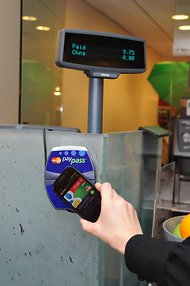Some retailers will soon have the option of charging extra fees to customers who pay with credit cards, as a result of a legal settlement in an antitrust lawsuit involving MasterCard, Visa and the big card-issuing banks.
It remains to be seen, however, if any merchants will actually do so.
The National Retail Federation, which wasn’t a party to the suit but which represents thousands of retailers affected by the settlement and opposes the deal, insists there is not broad support among merchants for credit card surcharges. A federation spokesman, Craig Shearman, said in an e-mail that the notion of widespread surcharges is “purely card industry propaganda.”
“While there can always be exceptions, merchants in general have no intention of surcharging,” Mr. Shearman wrote.
As The Times reported previously, a twist involving American Express cards makes it difficult for retailers that accept them to add surcharges for MasterCard and Visa cards.
And despite the settlement, the extra fees are still illegal in 10 states that prohibit credit card surcharges: California, Colorado, Connecticut, Florida, Kansas, Maine, Massachusetts, New York, Oklahoma and Texas. That means national retailers that have outlets in those states can’t impose them anywhere, according to the federation.
Mallory Duncan, the federation’s general counsel, said in a short phone interview that surcharge rules in the settlement are overly complex and favorable to the card industry.
The upshot, Mr. Duncan said, is that the settlement merely serves to provide cover to card companies to deflect criticism of their “swipe” fees, which merchants pay to banks when customers pay with credit cards. The fees typically range from 1.5 to 3 percent or more of the purchase amount. The federation has said it is exploring its “legal options.”
But in theory, at least, the fees could begin showing up as soon as late January, as a result of a preliminary settlement entered in the case in November, according to the lawyers who brought the suit. In the event that some retailers charge the extra fee, the group Consumer Action has published a pamphlet to help consumers know their rights when it comes to these potential “checkout” fees.
Retailers, for instance, must provide “clear disclosure” of any fees they are charging at the store’s entrance and point of sale or, for online merchants, on their Web site. The fee must also appear on the receipt. Merchants aren’t allowed to take advantage of customers, and the fee can’t be greater than what the store actually pays to accept credit cards.
It seems doubtful that such fees will become widespread, at least not right away. The cost of credit card “swipe” fees is already baked into the price of a store’s merchandise. And merchants may be reluctant to risk losing a sale, if a customer is annoyed at having to pay more when choosing to pay with credit.
It may be that retailers can use the possibility of charging such fees as a negotiating tool over the size of the swipe fees the stores pay, said Trish Wexler, a spokeswoman with the Electronic Payments Coalition, which represents banks and card-payment networks and which worked with Consumer Action on its pamphlet.
The settlement, while controversial, was announced this summer and received preliminary approval in federal court in Brooklyn on Nov. 27. (It applies to purchases made with credit cards, not debit cards.)
What would you do, if you encountered a store that charged you a fee for using a credit card?
Article source: http://bucks.blogs.nytimes.com/2012/12/27/new-card-fees-possible-but-unlikely/?partner=rss&emc=rss
